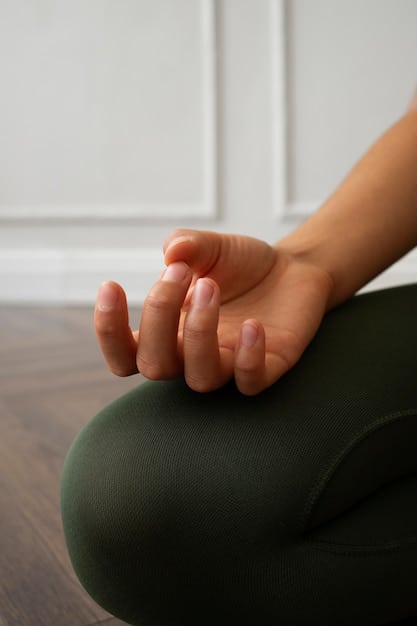How to Reduce Holiday Stress by 25% in 2025 with Mindfulness

Mastering mindfulness techniques can significantly reduce holiday stress, aiming for a 25% reduction by 2025 through consistent practice and mindful strategies adaptable to the unique challenges of the festive season.
The holiday season, while joyful, often brings a surge of stress. But what if you could navigate the festivities with greater ease and peace? This guide explores how mindfulness can reduce holiday stress by 25% in 2025: a practical guide to embracing the present moment.
Understanding Holiday Stress and its Impact
The holidays are often depicted as a time of joy and togetherness, but for many, they are also a peak period for stress and anxiety. Understanding the sources of this stress is the first step towards managing it effectively. This section will delve into the common stressors associated with the holiday season and their potential impact on your mental well-being.
Common Holiday Stressors
The holiday season comes with a unique set of stressors that can overwhelm even the most resilient individuals. These stressors often stem from a combination of financial pressures, social obligations, and heightened expectations.
- Financial Strain: The pressure to buy gifts, travel, and host gatherings can lead to significant financial stress.
- Social Expectations: Attending numerous social events and family gatherings can be draining, especially for those who are introverted or have strained family relationships.
- Time Constraints: Balancing work, holiday preparations, and social commitments can leave little time for relaxation and self-care.
- Unrealistic Expectations: The idealized image of the “perfect holiday” often clashes with reality, leading to disappointment and frustration.
These stressors can accumulate and manifest in various ways, impacting both mental and physical health.
The Impact on Mental Well-being
Unmanaged holiday stress can have significant consequences for mental well-being, leading to increased anxiety, depression, and overall reduced quality of life. It’s crucial to recognize these potential impacts and take proactive steps to mitigate them.
- Increased Anxiety: The anticipation of stressful events and social interactions can trigger heightened anxiety levels.
- Depression: The pressure to be joyful and the disappointment of unmet expectations can contribute to feelings of sadness and depression.
- Burnout: Constant demands and lack of self-care can lead to burnout, characterized by exhaustion and cynicism.
- Relationship Strain: Stress can negatively impact relationships with family and friends, leading to conflicts and misunderstandings.
By understanding the sources and impacts of holiday stress, you can better prepare yourself to implement mindfulness strategies to navigate the season with greater ease and resilience. Mindfulness offers a powerful tool for managing these stressors and reclaiming a sense of peace during the holidays.
In conclusion, recognizing the common stressors and their impact on mental well-being is essential for proactive stress management. By understanding these challenges, individuals can better utilize mindfulness techniques to navigate the holiday season with greater resilience and reduced anxiety.
What is Mindfulness and How Does it Work?
Mindfulness is the practice of paying attention to the present moment without judgment. It involves focusing on your thoughts, feelings, and sensations as they arise, without getting carried away by them. This section explores the core principles of mindfulness and how it can be applied to reduce stress during the holiday season.
Mindfulness is not about emptying your mind, but rather about observing your thoughts and feelings without getting caught up in them. It’s about being present in the moment, rather than dwelling on the past or worrying about the future. This simple yet profound practice can have a transformative effect on your mental and emotional well-being.
Core Principles of Mindfulness
Mindfulness is based on several core principles, including acceptance, non-judgment, and patience. Understanding these principles is key to effectively practicing mindfulness and reaping its benefits.
- Acceptance: Acknowledging and accepting your thoughts and feelings without trying to change or suppress them.
- Non-Judgment: Observing your thoughts and feelings without labeling them as good or bad, right or wrong.
- Patience: Approaching your mindfulness practice with patience and understanding, recognizing that it takes time and effort to develop.
- Beginner’s Mind: Approaching each moment with a sense of curiosity and openness, as if you are experiencing it for the first time.
These principles provide a foundation for cultivating a mindful approach to life, allowing you to respond to challenges with greater awareness and equanimity.
How Mindfulness Reduces Stress
Mindfulness reduces stress by helping you to become more aware of your thoughts and feelings, allowing you to respond to them in a more conscious and intentional way. By practicing mindfulness, you can break free from the cycle of reactivity and cultivate a greater sense of calm and control.
Mindfulness can help reduce stress by:
- Reducing Rumination: By focusing on the present moment, mindfulness can help to reduce the tendency to dwell on negative thoughts and past events.
- Enhancing Emotional Regulation: Mindfulness can help you to become more aware of your emotions and to regulate them more effectively, reducing emotional reactivity.
- Increasing Self-Awareness: Mindfulness can help you to develop a greater understanding of your thoughts, feelings, and behaviors, leading to increased self-awareness and self-compassion.

In essence, mindfulness offers a powerful tool for reducing stress by fostering greater awareness, acceptance, and emotional regulation. By incorporating mindfulness into your daily life, you can learn to navigate the challenges of the holiday season with greater ease and resilience.
In conclusion, understanding the core principles of mindfulness and how it reduces stress is essential for effectively incorporating it into your holiday routine. By embracing these principles, individuals can experience a significant reduction in stress and a greater sense of peace during the festive season.
Mindfulness Techniques for Holiday Stress Reduction
Now that we’ve explored the foundations of mindfulness, let’s delve into specific techniques that can be particularly effective for managing holiday stress. These practices are designed to be simple, accessible, and easily integrated into your daily routine, even amidst the holiday hustle.
These techniques are not about eliminating stress altogether, but rather about developing the ability to navigate it with greater awareness and resilience. By incorporating these practices into your daily life, you can cultivate a greater sense of calm and control, even during the most hectic moments of the holiday season.
Breathing Exercises
Breathing exercises are a fundamental mindfulness technique that can be practiced anytime, anywhere. Focusing on your breath helps to anchor you in the present moment, calming your mind and reducing anxiety.
One simple breathing exercise is the 4-7-8 technique:
- Inhale deeply through your nose for a count of 4.
- Hold your breath for a count of 7.
- Exhale slowly through your mouth for a count of 8.
Repeat this cycle several times, noticing how your body and mind begin to relax. This technique can be particularly helpful when you feel overwhelmed or anxious.
Mindful Meditation
Mindful meditation involves focusing your attention on a single point, such as your breath, a sound, or a sensation in your body. When your mind wanders, gently redirect your attention back to your chosen focus. One may wish to search on youtube for guided meditations.
To practice mindful meditation:
- Find a quiet place where you can sit comfortably.
- Close your eyes and focus on your breath.
- Notice the sensation of the air entering and leaving your body.
- When your mind wanders, gently redirect your attention back to your breath.
Body Scan Meditation
Body scan meditation involves bringing awareness to different parts of your body, noticing any sensations without judgment. This practice can help you to become more attuned to your physical sensations and to release tension.
How to do it:
- Lie down in a comfortable position.
- Close your eyes and bring your attention to your toes.
- Notice any sensations in your toes, such as warmth, tingling, or pressure.
- Slowly move your attention up your body, noticing sensations in each part.
- Continue until you reach the top of your head.
In essence, incorporating these mindfulness techniques into your daily routine can significantly reduce holiday stress by fostering greater awareness, calm, and emotional regulation. Regular practice allows you to navigate the festivities with greater ease and resilience.
In conclusion, these specific mindfulness techniques offer practical tools for managing holiday stress. By incorporating breathing exercises, mindful meditation, and body scan meditation into your daily routine, individuals can cultivate a greater sense of calm and resilience during the festive season.
Integrating Mindfulness into Your Holiday Routine
Integrating mindfulness into your holiday routine involves making conscious choices to bring awareness to your daily activities. This means finding ways to be present and engaged in whatever you’re doing, rather than rushing through tasks on autopilot. This section explores practical strategies for incorporating mindfulness into various aspects of your holiday experience.
This integration is not about adding more tasks to your already busy schedule, but rather about shifting your perspective and approach to the activities you’re already doing. By bringing mindfulness to your holiday routine, you can transform even the most mundane tasks into opportunities for presence and connection.
Mindful Gift Shopping
Gift shopping can be a major source of stress during the holidays. However, by approaching it mindfully, you can transform it into a more enjoyable and meaningful experience.
- Set Intentions: Before you start shopping, take a moment to reflect on your intentions. What do you hope to achieve with your gifts? How do you want the recipient to feel?
- Focus on the Experience: Pay attention to your surroundings as you shop. Notice the sights, sounds, and smells of the holiday season.
- Choose Thoughtfully: Take your time to select gifts that are meaningful and aligned with the recipient’s values and interests.
Mindful Meal Preparation
Preparing holiday meals can be a hectic and stressful experience. By bringing mindfulness to the process, you can cultivate a sense of calm and connection, transforming meal preparation into a meditative activity.
- Engage Your Senses: Pay attention to the colors, textures, and aromas of the ingredients you’re using.
- Involve Others: Enlist the help of family and friends and make meal preparation a collaborative and joyful experience.
- Express Gratitude: Take a moment to appreciate the abundance of food and the opportunity to nourish yourself and others.

Mindful Socializing
Social gatherings can be both joyful and stressful during the holidays. By approaching social interactions mindfully, you can deepen your connections with others and reduce social anxiety.
Be considerate of other and their time and listen actively.
In conclusion, integrating mindfulness into your holiday routine can transform everyday activities into opportunities for presence, connection, and joy. By approaching gift shopping, meal preparation, and social interactions with mindfulness, individuals can significantly reduce holiday stress and enhance their overall well-being during the festive season.
Setting Realistic Expectations for a Peaceful Holiday
One of the biggest contributors to holiday stress is unrealistic expectations. The idealized image of the “perfect holiday” often clashes with reality, leading to disappointment and frustration. This section explores the importance of setting realistic expectations and cultivating a more flexible and accepting mindset.
Setting realistic expectations is not about lowering your standards or settling for less. Rather, it’s about aligning your expectations with reality and cultivating a more compassionate and realistic view of yourself and others. This shift in perspective can lead to greater peace and contentment during the holiday season.
Identifying Unrealistic Expectations
The first step in setting realistic expectations is to identify the unrealistic ones that you may be holding. These expectations often stem from societal pressures, past experiences, or personal insecurities.
Common unrealistic expectations include expecting:
- Everyone to be happy and get along perfectly.
- Every event to go smoothly without any hiccups.
- Yourself to be able to do everything and please everyone.
How to identify these expectations:
- Reflect on your past holiday experiences and identify any patterns of disappointment or frustration.
- Consider whether your expectations are based on reality or on idealized images of the holiday season.
- Ask yourself whether your expectations are reasonable and achievable, given your current circumstances.
With this information it will be much easier to plan and deal with unexpected situations.
Cultivating Flexibility and Acceptance
Once you have identified your unrealistic expectations, the next step is to cultivate flexibility and acceptance. This involves letting go of the need for control and embracing the inevitable uncertainties and imperfections of life.
Here are some tips:
- Practice Letting Go: Learn to let go of the need to control every aspect of your holiday experience.
- Embrace Imperfection: Accept that things will not always go according to plan, and that’s okay.
- Focus on the Positive: Shift your attention to the positive aspects of the holiday season, rather than dwelling on the negative.
Remember, the goal is not to eliminate expectations altogether, but rather to align them with reality and cultivate a more flexible and accepting mindset. This shift in perspective can lead to greater peace and contentment during the holiday season.
Consequently, individuals can set achievable goals and enjoy the festive season more fully by identifying unrealistic expectations and cultivating flexibility and acceptance. This approach fosters a more positive and grounded holiday experience.
The Long-Term Benefits of Consistent Mindfulness Practice
While mindfulness can be a powerful tool for managing holiday stress, its benefits extend far beyond the festive season. Consistent mindfulness practice can lead to long-term improvements in mental and emotional well-being, enhancing your overall quality of life. This section explores the lasting benefits of incorporating mindfulness into your daily routine.
The long-term benefits of mindfulness are not just about reducing stress, but rather about cultivating a deeper sense of awareness, resilience, and emotional well-being. By making mindfulness a regular part of your life, you can transform your relationship with yourself and the world around you.
Improved Mental Health
Consistent mindfulness practice has been shown to improve various aspects of mental health, including reducing anxiety, depression, and stress. By cultivating greater awareness and emotional regulation, mindfulness can help you to manage challenging emotions and navigate difficult situations with greater ease.
- Reduced Anxiety: Mindfulness can help to reduce anxiety by calming the nervous system and promoting a sense of relaxation.
- Decreased Depression: Mindfulness can help to alleviate symptoms of depression by fostering a greater sense of self-awareness and self-compassion.
- Better Stress Management: Mindfulness can help you to manage stress by teaching you to respond to stressors in a more conscious and intentional way.
Enhanced Emotional Well-being
In addition to improving mental health, consistent mindfulness practice can also enhance your overall emotional well-being. By cultivating greater self-awareness and emotional regulation, mindfulness can help you to build stronger relationships, increase your sense of purpose, and experience greater joy and fulfillment in life.
Tips to maintaining the practice:
- Set Realistic Goals: Start with small, achievable goals and gradually increase the amount of time you spend practicing mindfulness.
- Be Patient and Persistent: Mindfulness takes time and effort to develop. Be patient with yourself and don’t give up if you don’t see results immediately.
- Find a Supportive Community: Connect with others who are practicing mindfulness and share your experiences and insights.
By committing to consistent mindfulness practice, you can reap these long-term benefits and transform your life in profound ways. The journey towards mindfulness is a journey towards greater self-awareness, resilience, and well-being.
All in all, consistent mindfulness practice yields substantial long-term advantages for mental and emotional well-being. By integrating mindfulness into daily life, individuals can experience sustained improvements in their overall quality of life.
| Key Point | Brief Description |
|---|---|
| 🧘 Mindfulness Basics | Focus on present moment without judgment. |
| 😊 Reduce Rumination | Mindfulness curbs negative thought cycles. |
| 😌 Emotional Regulation | Enhances awareness of emotions to control reactivity. |
| 🎁 Mindful Gifting | Shop with intention, not just obligation. |
Do you agree that the frequency is important for learning?
▼
Mindfulness helps by focusing your attention on the present, reducing worry about the future or regrets about the past, which are common during the hectic holiday season. Also meditation is important to make the method efficient.
▼
Simple exercises include deep breathing, body scan meditation, and mindful walking. These practices help ground you in the present and calm your mind amidst holiday chaos.
▼
Aim for at least 10-15 minutes daily. Consistency is key, but even short moments of mindfulness throughout the day can make a difference in managing stress.
▼
Yes, mindfulness can improve your emotional regulation and empathy, helping you respond to family conflicts with more patience and understanding, reducing tension.
▼
Start by finding a quiet space and using guided meditations or apps to help focus your attention. Begin with short sessions and gradually increase the duration as you become comfortable.
Conclusion
Embracing mindfulness offers a powerful strategy to navigate the holiday season with greater ease and resilience. By incorporating simple techniques and setting realistic expectations, you can significantly reduce holiday stress and cultivate a more joyful and meaningful experience, potentially achieving a 25% reduction in stress by 2025 through consistent practice.





